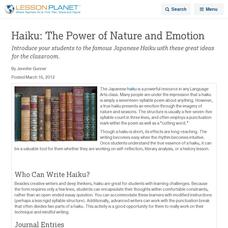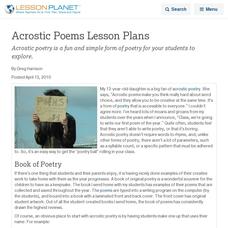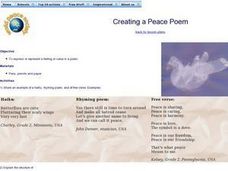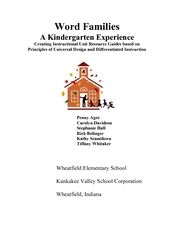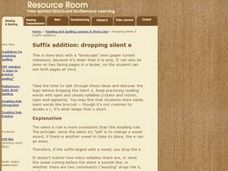Curated OER
Ending Consonant + le (Syllabication)
For this syllabication worksheet, students read six words that have the "le" ending. Students divide each word into syllables using a slash mark.
Teacher's Corner
Tanka
The Tanka, another fix from of Japanese poetry, is featured in the final exercise in a 10-part series of poetry writing activities.
Curated OER
Haiku: The Power of Nature and Emotion
Introduce your students to the famous Japanese Haiku with these great ideas for the classroom.
Curated OER
Japanese Poetry: Tanka? You're Welcome!
Students explore tanka, a form of Japanese poetry. They read and analyze tankas to determine the structure and intent, and compose a traditional and a non-traditional tanka.
Teacher's Corner
Haiku
The haiku, one of the most popular fixed forms, is the subject of this writing activity, the seventh in a series of ten poetry exercises.
Curated OER
Japanese Poetry: Tanka? You're Welcome!
Students explore the structure and content of the Tanka form and to arrive at a definition of the structure in English. They analyze a tanka to determine its structure and intent and compose two Tanka; one in traditional form and one...
Curated OER
Acrostic Poems Lesson Plans
Acrostic poetry is a fun and simple form of poetry for your students to explore.
Curated OER
Using Poetry As Inspiration for Composition
A reading of Robert Frost’s "The Road Not Taken" launches an interdisciplinary study of the connection between the meters of a poem and a melody. After identifying the number of beats in each line of the poem, young musicians use...
Curated OER
Animated Alphabet
Students explore English by completing an interactive language history activity. In this word recognition lesson plan, students discuss word formations and the phonetic relationship between letters. Students identify the origin of...
Curated OER
Poems: Identifying Patterns
Here is a great worksheet that contains two short poems to compare and contrast. Children will read each poem out loud and then complete three comparative analysis questions which focus on rhyme, structure, and language. Note: The...
Poetry4kids
Rhythm in Poetry: I Am the Iamb
It's fun to write a poem with iambs! Practice using iambs in all types of different poems with an online poetry lesson.
Curated OER
Introduction to Poetry
What makes a poem a poem? Give your class a basic understanding of some of the different aspects of poetry by showing them a slide show of poetic devices and elements. The presentation is quite long, so you might split it up into a few...
Curated OER
Learn-to-Read Pumpkin Patch
Students practice identifying and pronouncing the short letter "u" sound. In this phonetic awareness lesson, students access the Starfall.com website and follow the directions on the screen to reinforce the short "u" sound. Students can...
Curated OER
Prepositions
Elementary schoolers view and study ten pictures of the location of a ball adjacent to a box. They decide where the ball is and match it to its appropriate preposition on the right. A good language arts lesson!
Curated OER
Creating a Peace Poem
Second graders write a poem using words from a list and practice poetic forms. In this lesson on writing a peace poem, 2nd graders brainstorm words or phrases associated with "peace." Students choose a poetic form to express their...
Curated OER
Identifying and Generating Rhyming Words, Memory
Engage your class in a game where they look for matching rhymes. They will flip over cards and look for rhyming words. If the words match they keep the cards. If they words do not match they turn the cards over. Additionally, they will...
Poetry4kids
How to Write a Clerihew
Writing funny poems is the best part about learning poetic forms! Young poets learn all about clerihews—humorous four-line poems about people—with an explanatory lesson.
Florida Center for Reading Research
Phonological Awareness: Phoneme Isolating, See It-Sound It
Working pairs, early readers put their hands into a mystery box, pull out an item, then name and identify its initial phoneme.
Florida Center for Reading Research
Phonological Awareness: Phoneme Segmenting, Phoneme Closed Sort
Build phonological awareness with an activity that challenges learners to sort picture cards based on the number of phonemes each has.
Curated OER
Word Families: A Kindergarten Experience
Students study rhyming words. In this language arts lesson, students participate in several activities in which they practice rhyming words. Students match onsets and rhymes and practice spelling words.
Curated OER
Haiku: Observation and Writing in the Japanese Garden
Students observe a Botanical Gardens. Upon returning to the classroom, students write their own Haiku based on their observations.
Curated OER
Alphabet Organizer
Students practice organizing their vocabulary words in an online organizer tool. In this vocabulary lesson, students read a text and take notes. Additionally, students organize their vocabulary words into an online "Alphabet Organizer"...
Curated OER
Suffix Addition: Dropping Silent "e"
High schoolers engage in a lesson that is concerned with the concept of using the silent "e" in certain words. They practice using the rules while reading them in a review. The application of the rule is given in the lesson and can be...
Curated OER
Singing Patriotic Music
Students sing, alone and with others, a varied repertoire of patriotic music, including "America" and "The Star Spangled Banner," to sing expressively with appropriate dynamics, phrasing, and interpretation.
Other popular searches
- Syllable Counting Games
- Christmas Syllable Counting
- Winter Syllable Counting
- Syllable Counting Morning
- Syllable Counting Purpose


